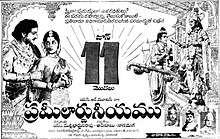Prameelarjuneeyam
Prameelarjuneeyam is a 1965 Telugu-language mythological film, produced by K. Adi Babu and K. Nagumani under the S.R. Movies banner[2] and directed by M. Mallikarjuna Rao.[3] It stars N. T. Rama Rao, B. Saroja Devi[4] with music composed by Pendyala Nageswara Rao.[5]
| Prameelarjuneeyam | |
|---|---|
 Theatrical release poster | |
| Directed by | M. Mallikarjuna Rao |
| Produced by | Kandimalla Adi Babu K. Nagumani |
| Written by | Pingali Nagendra Rao (story / dialogues) |
| Screenplay by | M. Mallikarjuna Rao |
| Starring | N. T. Rama Rao B. Saroja Devi |
| Music by | Pendyala Nageswara Rao |
| Cinematography | Ravikant Nagaich Rehaman |
| Edited by | N. S. Prakasam |
Production company | S.R. Movies[1] |
Release date |
|
Running time | 162 mins |
| Country | India |
| Language | Telugu |
Plot
The film starts at the end of Dvapara Yuga, Prameela (B. Saroja Devi), a beautiful woman and dynamic warrior who hates men, establish a kingdom for women. After the completion of the Kurukshetra War, Dharma Raja (Mikkilineni) performs Ashwamedha Yaaga by sending Arjuna (N. T. Rama Rao) as a guardian for Yaagaswa the horse. Arjuna starts along with Karna's son Rushakethu (Shobhan Babu). On the way, he meets Ghatotkacha's son Patti (Relangi) and all of them moves together. After crossing many kingdoms, Sage Narada (Padmanabham) diverts the horse towards Prameela's kingdom. As soon as horse enters their kingdom, the woman warriors capture the horse along with the men by a trap. Here they try to arrest Arjuna also when Lord Krishna (Kanta Rao) comes to his rescue and suggests an idea to make Prameela and all other women fall in love with men. Arjuna succeeds in it, Prameela starts loving him when Prameela's mentor Bhagavathi (Rushyendramani) awakes the female dominance. So, she stands up for the war with Arjuna, then Lord Krishna comes in between them and makes her realize that both men and woman are equal. Finally, the movie ends with the marriage ceremony of all men warriors with female warriors including Arjuna with Prameela.
Cast
- N. T. Rama Rao as Arjuna
- B. Saroja Devi as Prameela
- Kanta Rao as Lord Krishna
- Shobhan Babu as Rushikethu
- Relangi as Ghaku
- Padmanabham as Narada Maharshi
- Mikkilineni as Dharmaraja
- Balakrishna
- Vanisri as Gambiram
- Chandrakala
- Rajasree as Kittamma
- Girija as Maha Maaya
- Rushyendramani as Bhagavathi
- Chayadevi as Ranachandi
- Suryakala
- Athili Lakshmi as Adi Parashakti
Crew
- Art: Gokhale, Prabhakar
- Choreography: Pasumarthi, Heeralal
- Stills: Satyam
- Story - Dialogues - Lyrics: Pingali Nagendra Rao
- Playback: Ghantasala, P. Susheela, P. Leela, Jamuna Rani, Madhavapeddi Satyam, Pithapuram, Swarnalatha, Vasantha
- Music: Pendyala Nageswara Rao
- Editing: N. S. Prakasam
- Cinematography: Ravikant Nagaich, Rehaman
- Producer: K. Adi Babu, K. Nagumani
- Screenplay - Director: M. Mallikarjuna Rao
- Banner: S.R. Movies
- Release Date: 11 June 1965
Soundtrack
| Prameelarjuneeyam | |
|---|---|
| Film score by | |
| Released | 1965 |
| Genre | Soundtrack |
| Label | AVM Audio |
| Producer | Pendyala Nageswara Rao |
Music composed by Pendyala Nageswara Rao. Lyrics were written by Pingali Nagendra Rao. Music released by AVM Audio Company.
| S. No. | Song Title | Singers | length |
|---|---|---|---|
| 1 | "Sarva Mangala" | Ghantasala | 0:47 |
| 2 | "Beebhatsa Birudammu" | Ghantasala | 1:18 |
| 3 | "Bavaa Kothhagaa" | Ghantasala | 1:02 |
| 4 | "Jayahe Aadi Shakthi" | P. Susheela | 3:14 |
| 5 | "Oho Manogjnya Sundaree" | Ghantasala | 2:51 |
| 6 | "Dharani Samstha Rajkula" | P. Leela | 0:42 |
| 7 | "Purushulandune Veerulu" | P. Leela | 0:24 |
| 8 | "Ghana Kurukshetra" | Madhavapeddi Satyam, P. Leela | 1:36 |
| 9 | "Cheppandi Chuddam" | Madhavapeddi Satyam, Pithapuram, Swarnalatha | 2:36 |
| 10 | "Sari Kotta Kannenoyi" | P. Susheela | 3:06 |
| 11 | "Bhama Bhamakoka" | Madhavapeddi Satyam, Swarnalatha | 1:25 |
| 12 | "Jajiri Jajiri" | Jamuna Rani | 3:33 |
| 13 | "Ninu Nee Siggule" | Ghantasala | 1:10 |
| 14 | "Ninu Choosi Chudgane" | P. Susheela | 3:43 |
| 15 | "Pranaya" | Ghantasala | 1:06 |
| 16 | "Ghana Devvasurala" | Ghatasala | 1:26 |
| 17 | "Akhila Sangrama" | P. Leela | 0:33 |
References
- "Prameelarjuneeyam (Overview)". IMDb.
- "Prameelarjuneeyam (Banner)". Chitr.com.
- "Prameelarjuneeyam (Direction)". Filmiclub.
- "Prameelarjuneeyam (Cast & Crew)". gomolo.com.
- "Prameelarjuneeyam (Review)". The Cine Bay.